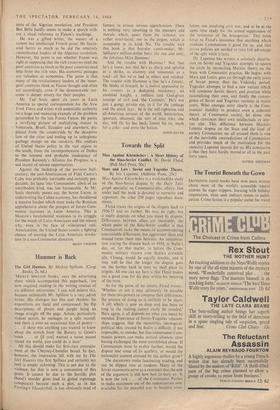Towards the Split
Mao Against Khrushchev : A Short History of the Sino-Soviet Conflict. By David Floyd. (Pall Mall Press, 50s.) State and Law : Soviet and Yugoslav Theory.
By No Lapenna. (Athlone Press, 25s.)' Mao Against Khrushchev is a workmanlike study of the Sino-SoViet dispute by the Daily Tele- graph specialist on Communist-bloc affairs. Just under half the book is devoted to narrative and argument; the other 250 pages reproduce docu- ments.
Floyd traces the, origins of the dispute back to 1956-57 and no farther. He may be right, but it really depends on what you mean by dispute. Differences between allies are inevitable; the whole point of the Sino-Soviet conflict is that Communism lacks the means of accommodating unavoidable differences, but aggravates them and instead turns them into heresies. An interpreta- tion tracing the dispute back to 1954, to Stalin's day, or, for that matter, to before the Com- munist military victory over Stalin's erstwhile ally, Chiang, would be equally tenable, and it may well be that the longer the dispute goes on, the farther back in time we shall place its origins. All one can say here is that Floyd makes out a good case for his date within his meaning Of the term.
As for the point of no return, Floyd writes: 'Whether. or not it may ultimately be possible for these two powers to compose their differences, the process of doing so is unlikely to be short. A rift which is now so deep and has been so long in the making cannot easily be mended.' Here again, it all depends on what you mean by mended.. Experience of Soviet-Yugoslav relation- ships suggests that the monolithic ideological- political bloc created by Stalin is difficult, if not impossible, to remake, but that independent Com- munist powers can make tactical alliances after having exchanged the most uninhibited abuse. If Communism were to evolve further, would the dispute lose some of,its acerbity, or would the nationalist content stressed by the author grow?
The documents make fascinating reading, and can be dipped into at random. Many of the Soviet statements serve as a reminder that the nub of the argument is still how best to .bury us. 'It is now the task . . . of the Communist Parties to make maximum use of the opportunities now available for the peaceful way to Socialist revo-
lution, not inv9lving civil war, and to be at the same time ready for the armed suppression of the resistance of the bourgeoisie.' This lends force to Floyd's insistence that anything which weakens Communism is good for us, and that active policies are needed to take full advantage of the split while it lasts.
Dr. Lapenna has written a scholarly disserta- tion on Soviet and Yugoslav attempts to square the circle by reconciling Marxist theory on the State with Communist practice. He begins with Marx and Lenin, goes on through the early years of Soviet power, then the Vishinsky period, Yugoslav attempts to find a new variant which will condemn Soviet theory and practice while rationalising their owti, and finally the conver- gence of Soviet and Yugoslav versions in recent years. What emerges most clearly is the Com- munists' inability to produce even a coherent theory of Communist society, let alone one which convinces their own intellectuals or any- one else. This difference between Marxist- Leninist dogma on the State and the kind of society Communists see all around them is one of the inevitable contradictions of Communism and provides much of the motivation for the casuistry Lapenna records for us. His conclusion is that they have hardly moved at all in the past forty years.
ALFRED SI !ERMAN


































 Previous page
Previous page